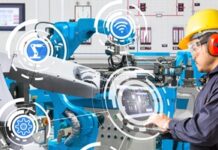
Unfortunately, according to Uri Guterman, Head of Product and Marketing at Hanwha Techwin Europe, new IPVM research shows that the current shortages and inflation are worsening — “and won’t let up anytime soon”. However, while all manufacturers are experiencing challenges in their supply chains, they are not all equally impacted. Here Uri explains how Hanwha Techwin is weathering the storm, in his opinion, better than some others, for a number of reasons.
Looking back
Of course, the effects of the Covid-19 pandemic on production are playing a major role. Lockdowns around the world meant that manufacturing was severely interrupted, while demand for many goods weakened. And, when assembly lines reopened once more, the huge demand for items such as microchips (and more) meant that manufacturers struggled to keep up. To make things worse, shipping containers full of those goods that had been manufactured, sat for weeks at ports as there were insufficient ships to carry them, workers to unload them, or trucks to transport the goods onwards.
Wider challenges
There are additional reasons that are exacerbating the situation, including labour shortages caused by workers switching jobs, once in a lifetime weather events that caused disruption, and even a freak incident that saw the Suez canal blocked for a week in March 2021. The war in Ukraine has brought additional pressures, and lies behind challenges such as a shortage of everything from wheat and sunflower oil to, most critically for the industry, half of the world’s neon (used in making chips).
China under lockdown
And while much of the world is beginning to see the return of some form of normality, for many, component shortages and disruptions to supply chains will be a concern for a while still. The reason, says Guterman, is that large parts of China including the major industrial city of Shenzen have been locked down as recently as March, and many cities remain under strict lockdown as part of an ongoing ‘zero Covid’ policy. Manufacturers with operations based there are clearly hampered as a result. As a Korean company with manufacturing based in Vietnam, Hanwha Techwin operates outside of China and therefore has not been as impacted in the same way as some companies operating within the country.
Oversight and control
Although there was a global shortage of electronic components in the pandemic, Guterman claims that Hanwha was able to adapt its products to account for any missing materials and components and continue product production largely on track. Direct manufacturing also gave Hanwha Techwin more oversight and control of production during the pandemic compared to competitors who were using third parties for production. So the company was able to ensure that its workers could work safely on the factory floor and the production line kept running smoothly. As a result, Guterman says, “We are shipping 60-70% more units than we did a year ago!”
Scale = agility
For manufacturers, each new challenge has required a new approach — so the most resilient supply chains belong to manufacturers who can remain highly adaptive as situations unfold. Because of Hanwha Techwin’s scale, the organisation has the benefit of greater agility and its 60 year industrial track record of industrial experience has given it an added perspective compared with others in the sector. “We can buy materials in bulk far in advance, while our internal R&D team can quickly redesign a specific product if needed as raw material becomes limited”, says Guterman.
Dated components
He also comments on the potential dangers of stocking too far in advance. “It’s worth noting here that as a result of the pandemic many manufacturers invested large sums in stocking up their components instead of keeping product lines going. While this could be a sound short-term tactic, it doesn’t help in the long run as it leaves manufacturers with increasingly dated technology”. As AI in the industry advances, having the latest components will make a significant difference. Superior AI is heavily driven by having newer and more advanced chips that allow onboard AI processing and the ‘heavy lifting’ required.
Transport tactics
As we have already seen, the pandemic made it challenging to ship products around the world. “Shipping routes between Korea and Europe froze up so, to overcome this, we invested more in alternative transport, increasing air transportation and special transportation options (for example, in the U.S. we switched rail transport to trucking). Although this cost us more, it ensured our customers and installers continued to get the products they rely on,” explains Uri Guterman.
Leaning on our values
Guterman concludes by talking about industry-wide teamwork as a key to meeting these global challenges. “When the going gets tough, it is time to help one another get through it. Hanwha is rooted in “Challenge, Dedication, and Integrity” and the spirit of “Trust and Loyalty” is part of everything we do. That’s why we’ve built resilience and agility into our supply chain and production lines, and why I am communicating all of this to you, our customers, partners, and installers. We are dedicated to keeping the world moving — and that means planning for what we can control and having the adaptability to respond to events we cannot predict”.











